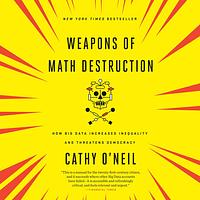Take a photo of a barcode or cover
1.05k reviews for:
Weapons of Math Destruction: How Big Data Increases Inequality and Threatens Democracy
Cathy O'Neil
1.05k reviews for:
Weapons of Math Destruction: How Big Data Increases Inequality and Threatens Democracy
Cathy O'Neil
love reading a book and hating corporate America; I maybe wish there was a little bit more math
adventurous
hopeful
informative
reflective
medium-paced
The introduction focuses on the flawed “algorithm secret sauce” of the IMPACT evaluation system, specifically the value added component, so obviously I could directly connect. I’m looking forward to quoting this book in future meetings when data is pushed down our throats. Key takeaways: “The privileged are processed more by people, the masses by machines,” “models are opinions embedded in mathematics,” and “computers learned from the humans how to discriminate.”
challenging
informative
inspiring
reflective
sad
medium-paced
Absolutely essential reading for anyone interested in the hidden data structures that prop up and subsume our lives. O'Neil fueled my growing passion for working with data, laying bare the dire consequences of allowing innovation to wear bottom-line blinders. Data and algorithms have the potential to do amazing things, but the novelty of ingesting the secret sauce from Google and Netflix shouldn't outweigh the predatory nature of location-based profiling that resign individuals to a fate of a sometimes arbitrary demographic. "The quiet and personal nature of this targeting keeps society's winners from seeing how the very same models are destroying lives." Don't lose track of the good these things can portend. But arm yourself with knowledge. Question the reclusive experimentation of techno-states (i.e. Facebook, Amazon, etc.). Start here.
This was a succinct yet wide-ranging book on Big Data, covering everything from bank loans to college rankings to political polling. I appreciated that O'Neil laid out a clear thesis about the components necessary for an algorithm to be a "weapon of math destruction" and then provided examples of algorithms that did and did not meet these criteria. She showed how seemingly innocuous inputs can perpetuate inequities and emphasized the need for checking whether there are unintended consequences causing harm as a result of the algorithm. One key point she mentioned a couple of times, which I think she could have highlighted more, was that the same algorithm can cause harm or not depending on the context in which it's used (e.g., flagging someone high-risk for recidivism and giving them greater supports rather than a longer sentence). Because she organized the book around different areas that use algorithms, the arguments were a bit repetitive at times, and I would have liked a little more in the way of practical recommendations for designing and deploying algorithms that do not cause harm. But for a relatively quick read I thought she included a lot of valuable information and made her points well.
This book discusses many good examples of how big data and models can increase inequality by being opaque, perpetuating or worsening already present disparities through negative feedback loops, not having enough emphasis on the consequences of false positives or false negatives, and having a lack of feedback and accountability among other traits. This book is written at a level meant for the general reader and does not require an advanced understanding of data science or algorithms. I recommend this book to those curious about the ways big data is already being used inappropriately in our society. This book is a jumping off point into further literature on the topic.
Infuriating. In spite of the fact that the author ends with a list of suggestions for ways we can regulate or otherwise detoxify the use of the algorithms she calls WMDs, I continue to hear in my head the chorus of "We're fucked, we're so fucked" that reading this book has only intensified.
This book does what it sets out to do: describes the areas of life (almost all of them) in which algorithms can and do unfairly penalize people for being poor or not of the preferred skin tone. It was a broad but fairly shallow survey; I would have enjoyed a bit more depth on the specifics of so-called data science.
Published in 2016/17... I'm sure by now O'Neil has quite a bit more to say about subsequent events.
This book does what it sets out to do: describes the areas of life (almost all of them) in which algorithms can and do unfairly penalize people for being poor or not of the preferred skin tone. It was a broad but fairly shallow survey; I would have enjoyed a bit more depth on the specifics of so-called data science.
Published in 2016/17... I'm sure by now O'Neil has quite a bit more to say about subsequent events.
summary: we live in a dystopia, but it's possible to fix it, believe it or not. also computers suck. but only because humans do.







